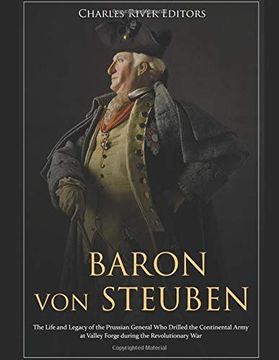Baron von Steuben: The Life and Legacy of the Prussian General who Drilled the Continental Army at Valley Forge During the Revolutionary war (en Inglés)
Reseña del libro "Baron von Steuben: The Life and Legacy of the Prussian General who Drilled the Continental Army at Valley Forge During the Revolutionary war (en Inglés)"
*Includes pictures*Includes contemporary accounts*Includes online resources and a bibliography for further reading"You say to your soldier, 'Do this' and he does it. But I am obliged to say to the American, 'This is why you ought to do this' and then he does it." - attributed to Baron von Steuben By the time the Revolutionary War started, military confrontations between the world powers had become so common that combat was raised to the status of a fine art, consuming a large portion of time for adolescent males in training and comprising a sizeable component of the economy. Weaponry was developed to a degree of quality not accessible to most North Americans, and European aristocrats were reared in the mastery of swordsmanship with an emphasis on the saber for military use. Likewise, the cavalry, buoyed by a tradition of expert horsemanship and saddle-based combat, was a fighting force largely beyond reach for colonists, which meant that fighting on horses was an undeveloped practice in the fledgling Continental Army, and the American military did not yet fully comprehend the value of cavalry units. Few sword masters were to find their way to North America in time for the war, and the typical American musket was a fair hunting weapon rather than a military one. Even the foot soldier knew little of European military discipline. German participation is historically noted for the Hessians, mercenary soldiers recruited in whole companies by Britain, whose standing army featured relatively low numbers when the American Revolution began. However, other Germans noted for their mastery of the science of war sided with the colonies, and among the most essential European contributors to the American cause turned out to be a Prussian officer of German descent. Though he hailed from dubious lineage, he enjoyed the full title of Baron Friedrich Wilhelm Rudolf Gerhard Augustin von Steuben, and when he came to fight in the Revolution, his purportedly lustrous military credentials could not be accurately verified by the American liaisons who were in contact with him. Like the Marquis de Lafayette before him, von Steuben came to Washington's army via the recommendation of Benjamin Franklin, who hoped to use their appointments to curry political favor internationally. Furthermore, the letters sent with von Steuben to America underwent such upgrades of prestige and glamorization as to frame his introduction as a national deceit. Despite the wavering attention paid by the colonial representatives to his biography, von Steuben may well have contributed more to the rebel victory than any other single presence on the American continent. After another disappointing year of defeats in 1777, Washington's 11,000 men entered winter quarters at Valley Forge in Pennsylvania, about 20 miles outside of occupied Philadelphia. His army had repeatedly faced a lack of discipline and chronic disorganization, and Congress began to consider replacing Washington, who was understandably devastated. Making matters worse, the winter was unusually harsh, leading to an estimated 2,000 or so deaths in camp from diseases. Gouverneur Morris would later call the soldiers at Valley Forge a "skeleton of an army...in a naked, starving condition, out of health, out of spirits."However, it was at Valley Forge that Washington truly forged his army, most notably by implementing a more rigorous training program for his troops that was led by von Steuben, who had fought with Frederick the Great. Despite speaking little English, von Steuben went about drafting a drill manual in French, and he personally presided over training drills and military parades. With the help of von Steuben, the Continental Army left Valley Forge in the spring of 1778 a more disciplined army than ever before, and the worst of Washington's failures were behind him. Von Steuben would continue to serve with the Continental Army through the end of the war.

